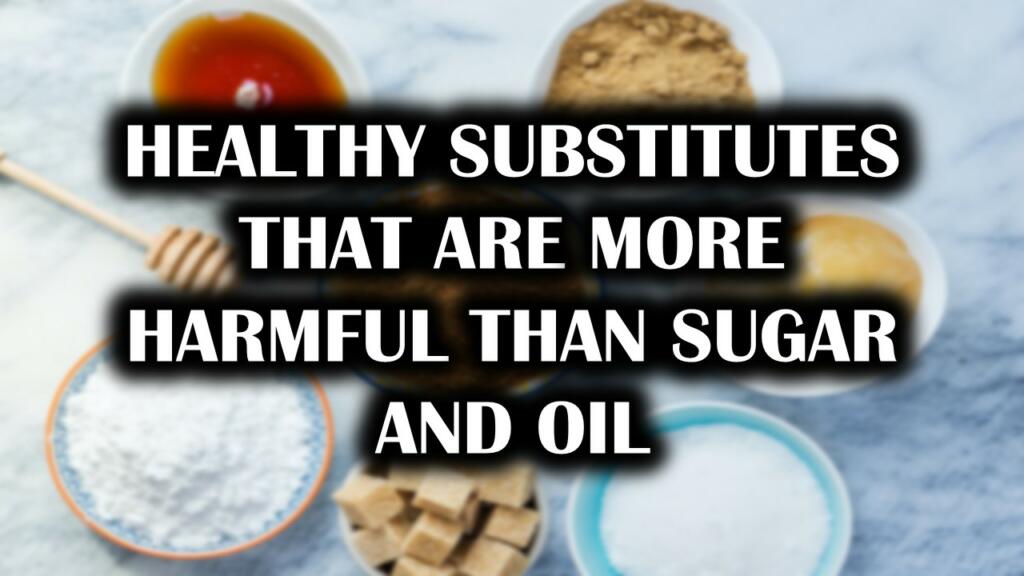In the quest for healthier alternatives to sugar and oil, many individuals turn to alternative products marketed as “healthy” substitutes. Unfortunately, not all of these alternatives are as beneficial as they claim to be. While artificial sweeteners have been under scrutiny for their potential health risks, there are several other so-called “healthy” substitutes that can pose even greater dangers. In this article, we will shed light on seven such substitutes that are more harmful and potentially cancerous than sugar and oil.
Margarine:
Margarine, often promoted as a healthier alternative to butter, is made through hydrogenation, a process that converts liquid oils into solid fats. This process produces trans fats, which have been strongly associated with an increased risk of heart disease, inflammation, and certain types of cancer. Opting for small amounts of natural, unprocessed butter may be a better choice.
Also read:- How Dairy Milk became the ‘Facebook’ of chocolate industry
Also read: Vegetarian Delights of Karnataka: Unveiling the Hidden Gems
Agave Syrup:
Regarded as a natural sweetener, agave syrup has gained popularity due to its low glycemic index. However, it is highly concentrated in fructose, which can lead to adverse effects on metabolism, including insulin resistance and increased liver fat. Excessive consumption of fructose has also been linked to an elevated risk of obesity, type 2 diabetes, and certain types of cancer.
Coconut Oil:
Coconut oil has been touted for its various health benefits, but its high saturated fat content makes it a controversial choice. Although it contains medium-chain triglycerides (MCTs), which may provide certain health advantages, the predominance of saturated fat in coconut oil can raise LDL cholesterol levels, potentially contributing to cardiovascular diseases. A balanced approach to fat consumption, incorporating healthier options like olive oil, is recommended.
Rice Syrup:
Rice syrup, often regarded as a natural sweetener, is derived from brown rice. However, the manufacturing process involves enzymatic treatment that converts the rice starch into glucose. Unfortunately, this process also produces arsenic, a toxic element known to be carcinogenic. Regular consumption of rice syrup may contribute to long-term health risks, including cancer development.
Soy Protein Isolate:
Soy protein isolate is a highly processed form of soy, often found in protein bars, shakes, and meat substitutes. During its production, soybeans are subjected to intense chemical extraction and purification processes, which can result in the formation of toxic byproducts such as lysinoalanine and nitrites. These compounds have been linked to various health concerns, including cancer development.
Also read: Indian Sports-persons Who Deserve a Biopic/Web Series of Their Own
Non-Dairy Creamers:
Non-dairy creamers are commonly used to add flavor and creaminess to coffee and tea. However, they often contain partially hydrogenated oils, which are a significant source of trans fats. Regular consumption of trans fats has been associated with an increased risk of heart disease, stroke, and certain types of cancer. Opting for healthier alternatives like almond or oat milk can be a better choice.
Low-Fat and Fat-Free Products:
Many low-fat and fat-free products are marketed as healthier options for weight management. However, they often compensate for the reduction in fat content by increasing sugar, artificial additives, and unhealthy fillers. These additives can contribute to inflammation, insulin resistance, and obesity, potentially raising the risk of chronic diseases, including cancer.
While the intention behind seeking healthier alternatives to sugar and oil is commendable, it is essential to critically evaluate the substitutes available in the market. The seven substitutes discussed in this article—margarine, agave syrup, coconut oil, rice syrup, soy protein isolate, non-dairy creamers, and low-fat/fat-free products—have their own drawbacks, some of which may be more harmful and cancerous than sugar and oil themselves. It is crucial to prioritize a balanced and varied diet, incorporating natural, minimally processed foods to support overall health and well-being.
Support TFI:
Support us to strengthen the ‘Right’ ideology of cultural nationalism by purchasing the best quality garments from TFI-STORE.COM
